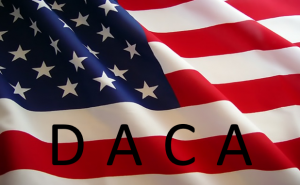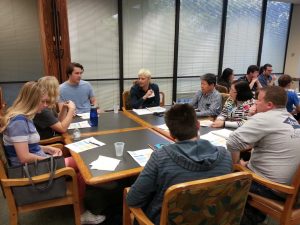
The future of DACA and what people are saying about it
On April 19, a forum was held at UHCL about immigrants coming to America, specifically who should be welcomed and what should be done about undocumented immigrants currently living in the U.S.
The forum was sponsored by the Department of Social and Cultural Sciences and the Political Science Student Organization, with UHCL students moderating the discussion. The discussion used material from The National Issues Forums’, “Coming to America: Who should we welcome? What should we do?” More information can be found here. The panel addressed current immigration policies in the U.S. including travel bans in countries such as Iran and Syria and a reversal of the DACA program.
The Deferred Action for Childhood Arrivals, or DACA, the policy is an Obama-era initiative designed to protect individuals who were brought to America as children, also known as “dreamers,” from being deported. The policy has been the topic of heated discussion among Congress, policymakers and American citizens. The debate over DACA continues to drag on, leaving dreamers and their loved ones in a state of uncertainty.

President Donald Trump ended the DACA program in September 2017, after which several state attorneys generals threatened to sue Trump for an overreach of presidential power. Trump gave Congress a March 5, 2018, deadline to come up with a new policy regarding immigrant childhood arrivals. Nevertheless, an agreement was not made.
Recent changes have been made regarding the DACA policy, but for the time being, the program remains in place with many advocating for and against it. Unless the administration can reach a decision in the coming three months, the decision to end the program will be rescinded and immigrants may submit new applications.
To find out the latest information on what DACA means for dreamers click here.
The UHCL Latina/o and Latin American Studies Program issued a statement in support of the DACA program. Members of the program advocate for a more inclusive and open immigration policy. The issued statement included the fact that those who remain in the United States via DACA only benefit in terms of not being deported. They do not receive welfare or other social services. The Latina/o and Latin American Studies Program advocates for the support of dreamers from the community.
“As the daughter of an undocumented migrant farm worker, I have come to realize just how difficult it is to navigate through the various systems in the United States,” said Roberta Leal, assistant professor of social work and Bachelor of Social Work Field Director. “Coming from a blended-status family, my status as a U.S. citizen afforded me opportunities some of my cousins living in the U.S. did not readily have. Immigrants in the United States contribute greatly to the U.S. and Texas economy while simultaneously having some of the lowest crime rates,”

Leal pointed out that UHCL is a Hispanic Serving Institution and, as a social work faculty member, she is happy to support the school’s Latinx students with connections to resources that will help them achieve their goals in higher education and the workforce.
The Coming to America forum discussed issues such as the ones Leal expressed.
“As a student moderator of this deliberative forum, I intend to create an atmosphere that will allow participants to express themselves in depth, safely and without the need for a conventional debate while discovering common ground,” said student moderator Cody Sprouse in advance of the event.
The forum began with an overview of the issues at hand, and guests were broken into smaller groups for discussion. Discussions were broken down into three parts, option 1, 2 and 3 each evaluating a different suggestion regarding the American stance on immigration.
“The goal is for each individual to express their beliefs and views based on personal experience, separate from all partisan influence; there is absolutely no intention of solving immigration, no side will win,” instructed Student Moderator Andrea Gerlach, as participants broke into groups
Each group began their deliberation discussing the first option, “welcome immigrants, be a beacon of freedom.” The main idea behind option one contends that immigration has helped make America what it is today. The primary drawback would be additional burdens on systems that are already overwhelmed by historically high levels of immigration.
Group participants in the forum generally leaned toward the same opinions regarding this option to welcome immigrants. Suggestions voiced about how to implement this option included enacting a path to citizenship incorporating certain duties, such as community service, that must be done to earn a legal status for immigrants. If such requirements are not met, it would constitute a penalty, such as a fine.
The groups also discussed an action proposed by The National Issues Forums to forgive illegal immigrants and grant them citizenship. A possible drawback stated was immigrants entering the country illegally would be “cutting in front of” those who are seeking to enter the United State legally.
“It’s not a zero-sum game,” said Forum Participant Claire Morel. “It’s not one or the other.”
A consensus was reached with participants agreeing that granting previously illegal immigrants citizenship would not take away from those currently waiting to enter America. A proposed step for resolution was a mutual agreement for mandatory requirements for citizenship or a green card.
The second option discussed in the forum was to “enforce the law, be fair to those who follow the rules.”
This idea did not fare well with many of the forum participants. With actions such as, “acquire people who enter the country illegally and deport them” listed, the drawbacks were heavily discussed. Comments were made stating this option only incites fear instead of reaching a resolution for the immigration policy debate.
Option three proposed that the U.S., “slow down and rebuild our common bonds.” This option recognized that newcomers have strengthened American culture in the past. Furthermore, it stated there is a need to moderate the flow of immigrants and focus more on assisting newcomers as they join American society. It also suggested finding a way to accommodate newcomers without compromising national security. With many different opinions discussed, one closing remark was made that those not directly affected by immigration policies and the debates surrounding them are viewing these options from an outsider’s point of view.
Because of the nature of the topic and the current political climate regarding immigration, moderators closed the forum by reminding all participants that it is important to note that the forum was not intended to reach a definite solution or agreement. Rather, it was conducted with the purpose of evaluating the ultimate goal regarding immigration instead of focusing on immediate actions to implements these goals.

All illegals must be deported no exceptions.